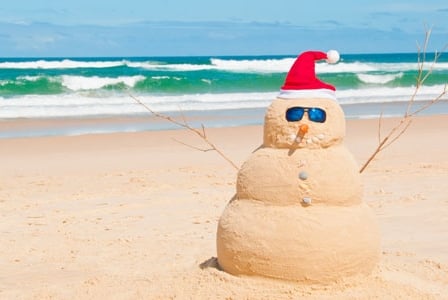
Many of our favourite things during the holiday season may be threatened by future climate change. What are some of the things we may lose?
If you’re flashing that smug “I’m all ready for Christmas” smile at everyone you meet these days, beware who you smile at. You might meet a climate scientist ready to burst your bubble with news about what your future Christmases might look like with climate change.
Holiday baking
If peanut butter factors into any of your holiday cookies, you’ve already noticed a change. The prices for peanuts spiked this year following extreme heat in the US south where much of the peanuts we eat originate. Pecans have also been affected, and walnut trees may be lost in the coming years to extreme weather.
Chocolate
If temperatures rise by the anticipated one degree by 2030, the small cocoa farms in Western Africa will be devastated, according to Colombian researchers. A further one-degree rise will almost certainly make growing cocoa plants at the elevations where they are currently farmed impossible. If that doesn’t make chocoholics everywhere reconsider their carbon footprint, nothing will!
Coffee
Though we realize coffee isn’t just a Christmas tradition, we know most parents appreciate the boost on those early Christmas mornings—not to mention those late nights at the mall. Just as cocoa farms are threatened by climate change, so too are coffee plantations. The warmer temperatures and drought will also increase the pest population. We can at least do our part by buying fair trade, organic, and bird friendly which guarantees shade-grown coffee. This prevents deforestation and provides habitats for songbirds and other animals that prey on pests, eliminating the need for pesticides.
Wine
Toasting in the New Year wouldn’t be the same without our favourite bubbly. Climate change may create an entirely different wine industry, eliminating traditional areas due to extreme heat and drought. Be prepared to lift a glass of Tuktoyaktuk Red in the years to come.
Holiday ham
If your holiday meal isn’t complete without a ham, you’ll want to make some plans for your future—unless, of course, you’ve already made the switch to organic, grass-fed pork. The prices of traditional hams may skyrocket if temperature surges continue to destroy cornfields—the primary source for pig feed. Th-th-th-that may be all, folks, for future Porkies.
For the time being, tuck into that organic holiday ham; enjoy the festive cookies, chocolate, and coffee; and toast the New Year—with a firm resolution to hold onto cherished traditions.



